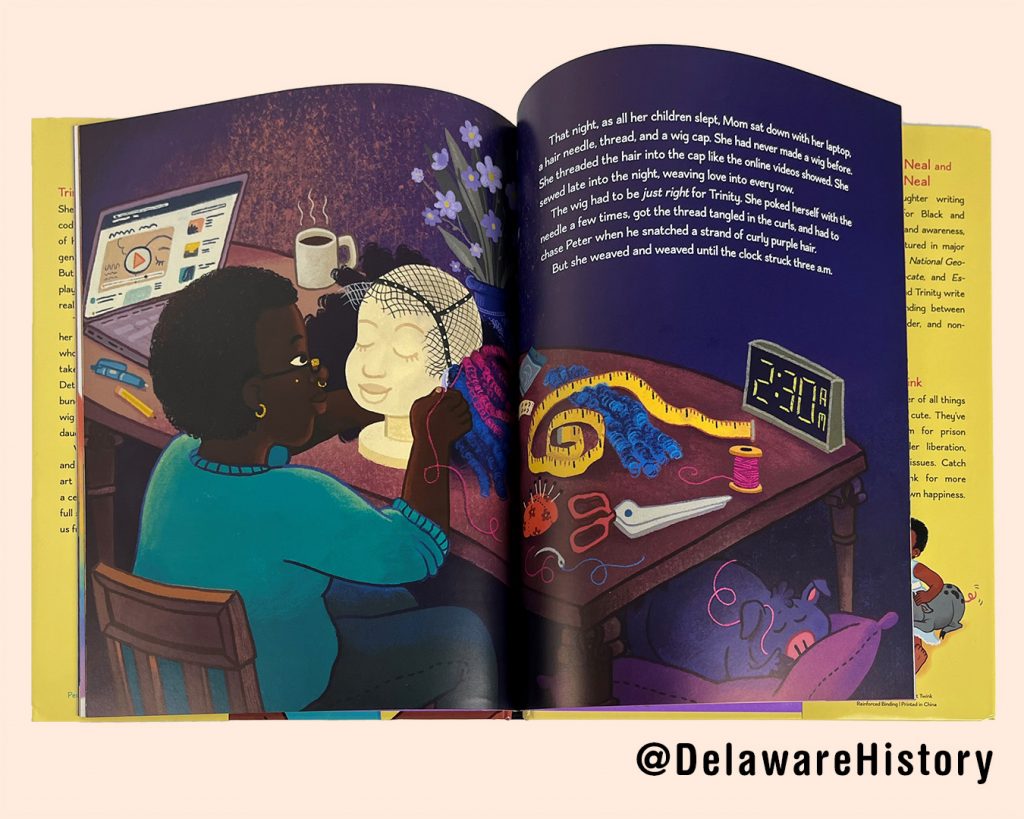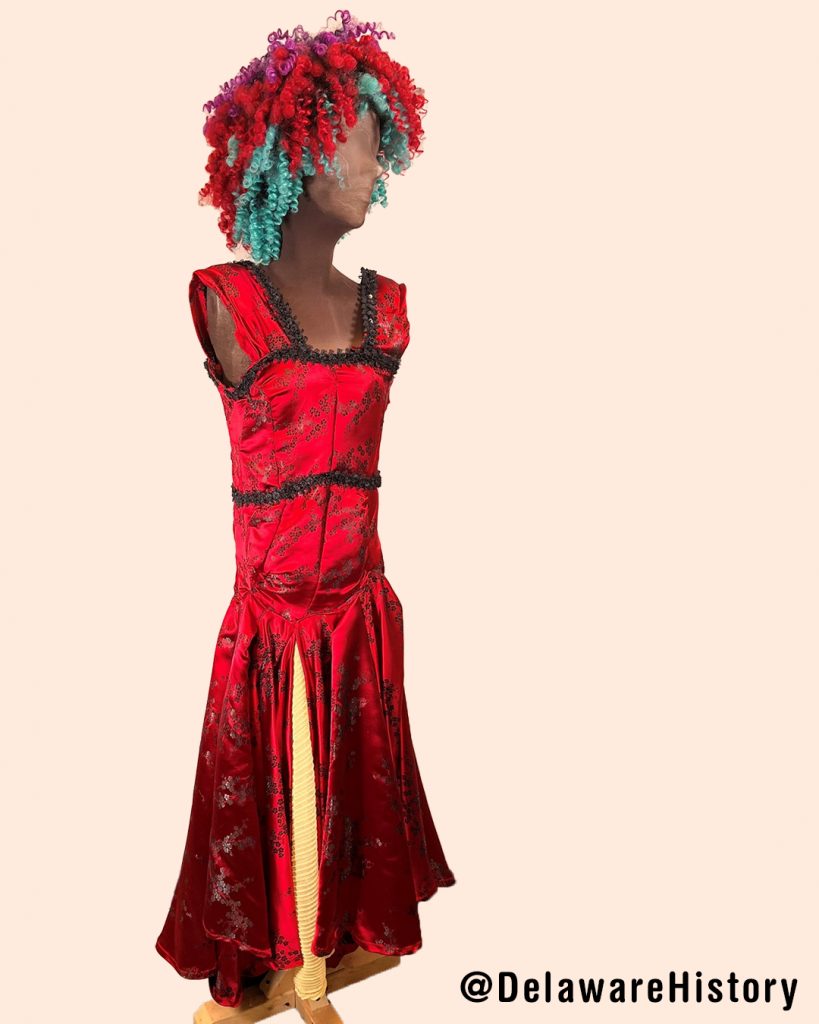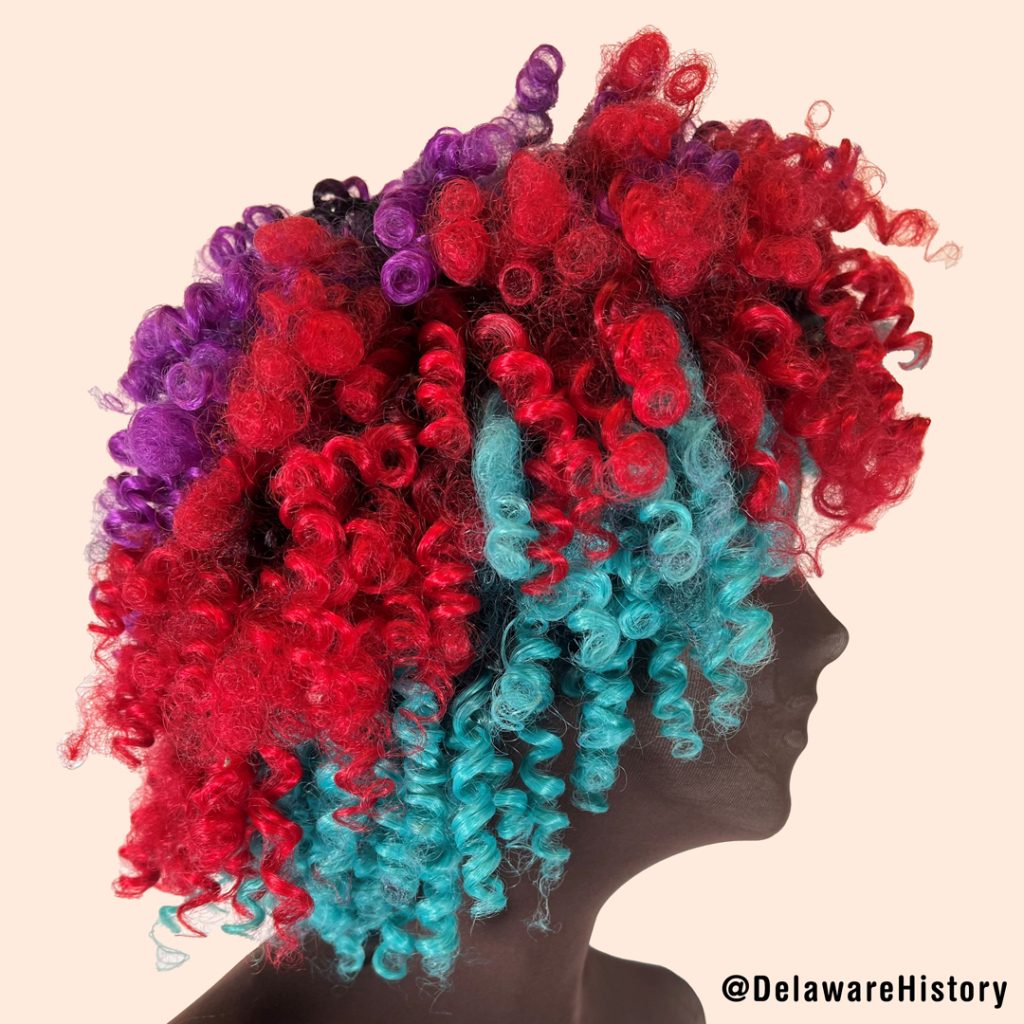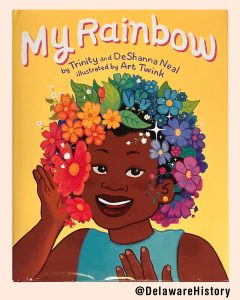Collection close-up: “Rainbow” Wig, Gala Dress and My Rainbow
By Elizabeth Coulter, curator of collections, and Carolanne Deal, inclusive history researcher
The Division of Historical and Cultural Affairs has recently accessioned into the State’s Historic Collection a group of objects from mother-daughter duo, DeShanna and Trinity Neal. These objects represent Trinity Neal living as her true self, and her mother’s tireless efforts to raise awareness for transgender rights and access to gender-affirming healthcare.
DeShanna Neal grew up in Wilmington, Delaware, where they still live with their four children. Their oldest child, Trinity Neal, assigned male at birth, knew she was a girl by age 4, but because she was living as a boy, experienced extreme depression. After consulting a psychiatrist and child-care professionals, Trinity Neal was diagnosed with Gender Dysphoria, a form of psychological distress that is “a marked incongruence between one’s expressed gender and the gender assigned at birth (natal gender), which may be apparently by behaviors or preferences consistent with the non-natal gender.”
Trinity Neal’s therapist advised DeShanna Neal to “choose between a happy little girl or a dead little boy,” because suicide is the leading cause of death for transgender youth. They chose their daughter and have been supporting and advocating for Trinity since that moment.
One of the most significant ways DeShanna Neal advocated for Trinity was battling with the family’s Medicaid provider to cover the cost of her daughter’s gender-affirming care
. Around 2015, when Trinity Neal was approaching male puberty, her doctors prescribed puberty blockers, medication that would prevent the release of testosterone and sexual development. However, Medicaid refused to pay for the treatment. DeShanna Neal appealed the decision and, through a laborious process, sent letters to Governor Jack Markel, the Director of Medicaid, the Insurance Commissioner and state health officials citing the denial as a violation of the Affordable Care Act, section 1557, which prohibits denying care on the basis of gender identity.After eight months of appeals, they were successful. By the age of 13, Trinity Neal became the first minor in Delaware to have Medicaid cover her gender-affirming care, setting a precedent for other low-income transgender children. Trinity Neal was also the first minor to petition the county court and successfully change her gender marker on her birth certificate to female. In response to this victory, she said, “it suits me, I’m finally here.”

This small collection of objects newly added to the State’s Historic Collection encompasses the Neals’ personal story and represents significant moments in their lives. The wig commemorates Trinity Neal’s start to living as her true self. After announcing her identity, she articulated how she wanted to have long hair, like her dolls, to express her real self. After visiting the beauty supply store, none of the wigs fit her quite right, so DeShanna Neal decided to make a wig for their daughter instead. Trinity Neal is neurodivergent and has sensory sensitivities, so it was essential for the wig to fit comfortably. DeShanna Neal purchased bundles of curly hair to reflect their daughter’s natural black curls, and with the help of Lucien Neal, her second-born and oldest son, they selected the colors teal blue, dark pink and purple to represent a rainbow. DeShanna Neal watched instructional videos online and handmade this wig for their daughter overnight. Once their daughter tried on the wig, she was thrilled with the result.


(Dress, 2017, silk, ribbon, tulle, 2022.002.003, Delaware Division of Historical and Cultural Affairs. Wig, 2007, synthetic fiber, 2022.002.001, Delaware Division of Historical and Cultural Affairs.)
In addition to the wig, this collection includes another hand-made garment by DeShanna Neal for their daughter, a dress Trinity Neal wore to the 2017 Parents, Families, and Friends of Lesbian and Gays (PFLAG ) “Straight for Equality” Gala. After their story went viral in 2016, being covered by multiple national media outlets such as National Geographic, The New York Times and Essence, the Neals were invited to attend the PFLAG Gala in New York City. DeShanna Neal wanted their daughter’s dress to be unique and special like her, so once again, they created a custom garment for their daughter. Trinity Neal selected the pattern and fabric she wanted for the dress and her mother adjusted the adult-sized pattern to fit a child’s body. They also added a panel of gold fabric to the front for a more modest design and created padded straps to the dress for her sensory needs. It was DeShanna Neal’s largest sewing project to date, but it spoke to their love and dedication in celebrating their daughter and this positive opportunity for her.
Finally, this collection also includes a recently published book, titled “My Rainbow,” written by Trinity and DeShanna Neal and illustrated by Art Twink. The book documents their story, centered around the time DeShanna Neal created the rainbow wig for their daughter. The book honors Black transgender youth and neurodiversity, raising visibility to the multifaceted lived experiences of populations typically underrepresented, misunderstood and marginalized.
The Neals were intentional with who they chose to illustrate their book. Art Twink, a queer artist of color, worked collaboratively with the family, especially on the front covers of the book. On the dustjacket front cover is a portrait of Trinity Neal that recalls Marsha P. Johnson (1945-1992), a transgender woman activist and LGBTQ advocate known for wearing floral headpieces who has been an inspirational figure to the Neals. Once the sleeve is removed, the book’s alternate cover pictures a more realistic version of the colorful wig, now a part of the State’s Historic Collection.


(Trinity and DeShanna Neal, “My Rainbow,” 2020, 2022.002.002, Delaware Division of Historical and Cultural Affairs.)
When DeShanna Neal was asked how they felt about their family’s story being preserved in a museum collection they said:
“I can’t speak for Trinity but I know for me as her mother, the fact that when we first started this journey there was nothing to help educate me and provide me with understanding of how to help her and how to get others to treat her like a human being and not an oddity. So, seeing now where we are, 14 years later, I am so happy that when down the road, when we’re long and gone, and this is a non-issue, or becomes an issue again, parents who have children come out to them will have the ability to research and have access to knowing that they’re not alone in this. And there is plenty of information out there to educate them on how to be not only allies but advocates for their trans children.”
This small collection of objects, through personal narrative, exhibits an exemplary story of love, acceptance and social change. The Neals’ story, among many multifaceted stories not documented well in history, are a welcomed addition to the state’s collection. These newly accessioned objects, among others, are a part of a recent ongoing effort to collect and preserve histories that promote inclusivity in the state of Delaware.
The division currently accepts donations to the collections, which include around 100,000 objects, that support the agency’s mission and vision.


